What Are Keywords?
Keywords (also known as “SEO keywords," “keyphrases,” or “search queries”) are words and phrases that users type into search engines to find information on a particular topic.

In the world of search engine optimization (SEO), keywords are used in webpage content as a way of ranking at the top of Google’s results for that same keyword.
Important note: any term used in a search engine, whether a single word or a long phrase, is considered a keyword.
For example, the word “desert” is a keyword. But so is the multi-word phrase “which plants grow in the desert.”
See how the results page changes based on how specific the keyword is:
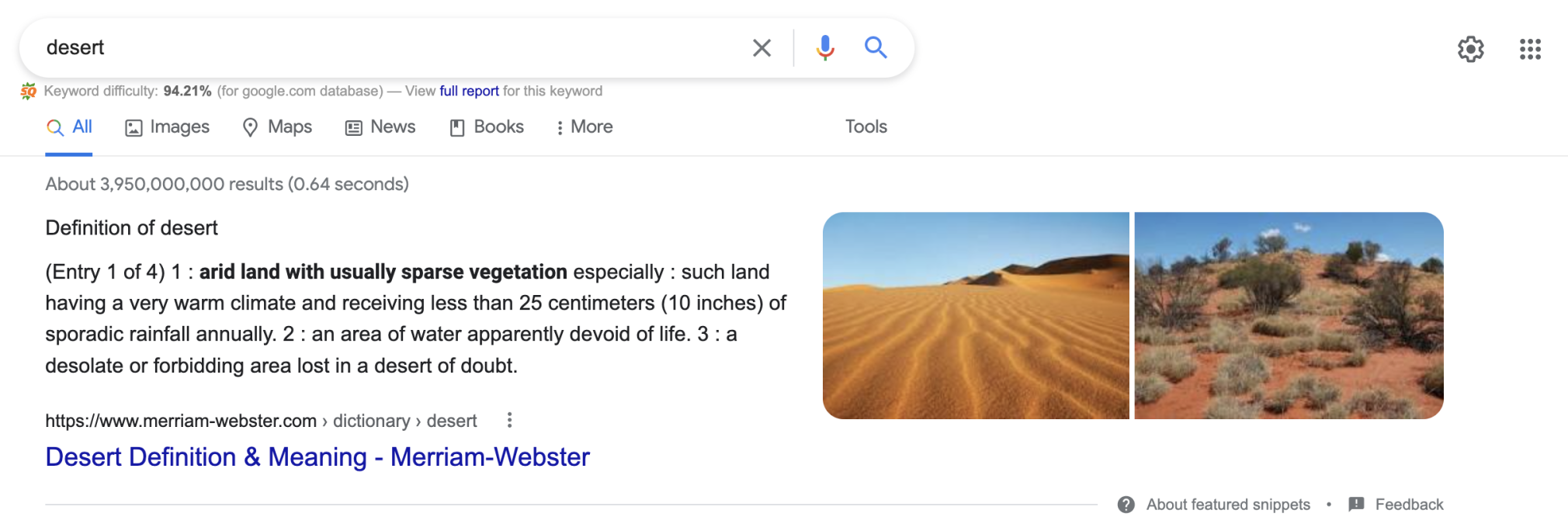
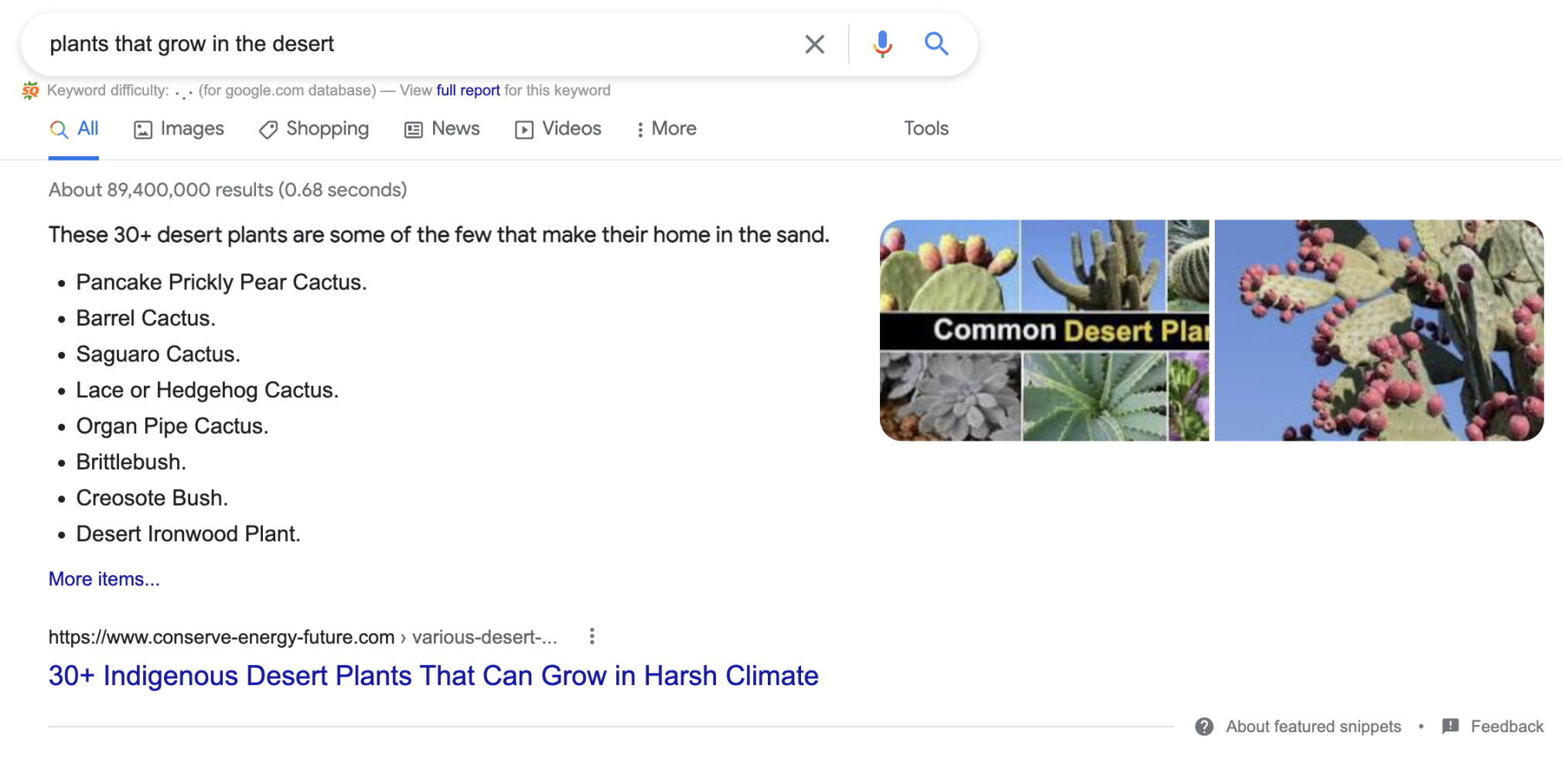
Why Are Keywords Important for Search Engine Marketing?
In many ways, keywords are the foundation of both SEO and pay-per-click (PPC) marketing campaigns.
When it comes to SEO, ranking at the top of Google for your target keyword can bring in a flood of quality, targeted traffic.
And if you have an advertising budget, you can use PPC to get your site positioned above the organic results.
This is how Google Ads works—advertisers bid to appear at the top of search results for specific keywords.
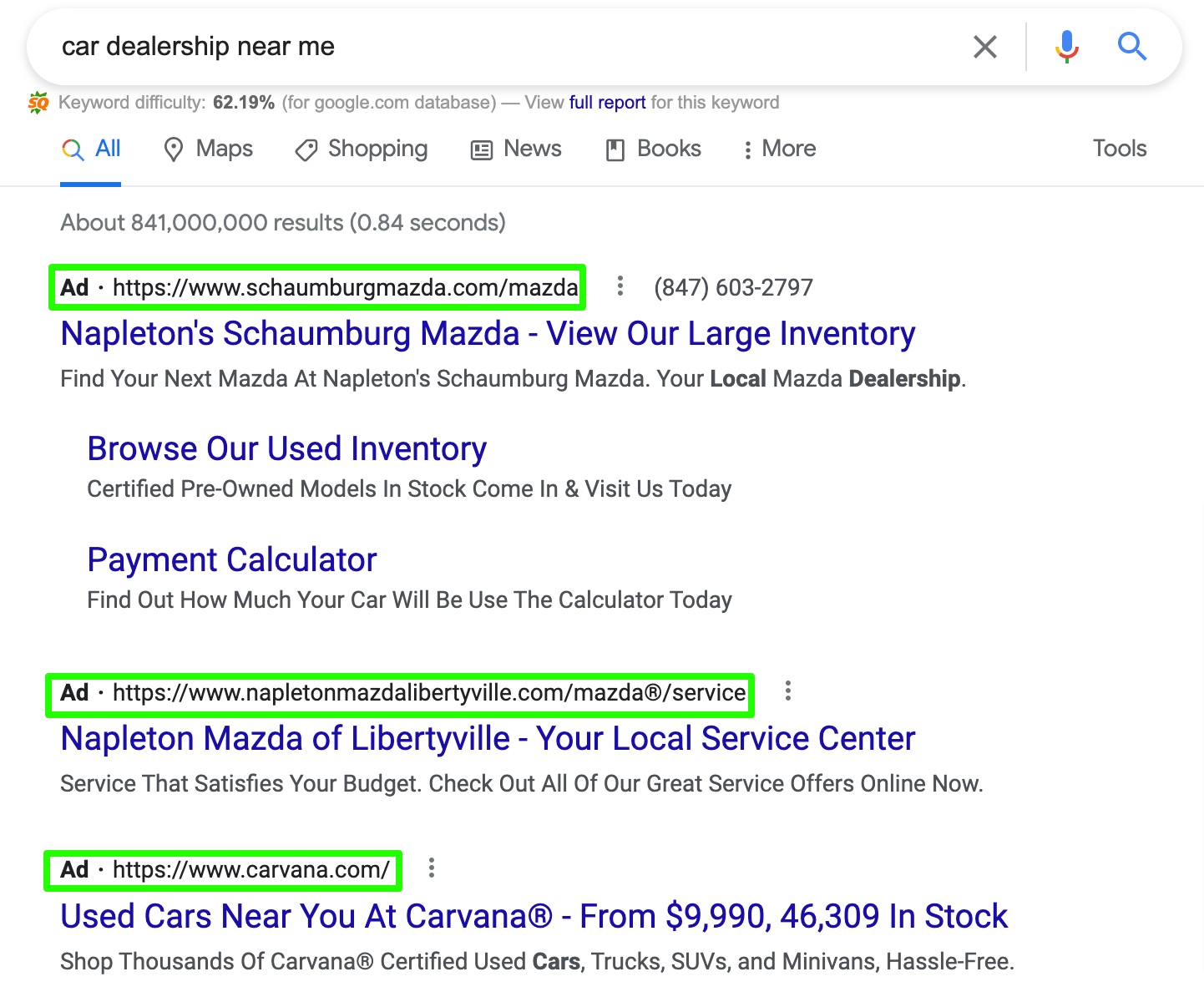
Generally speaking, keywords that signal someone is ready to buy could be good choices for a paid search campaign.
For example, let’s say that you’re doing marketing for a car dealership.
In that case, the keyword “Toyota for sale in San Jose” is a term that someone pretty close to buying would search for.
Sure enough, there are plenty of ads for that keyword.
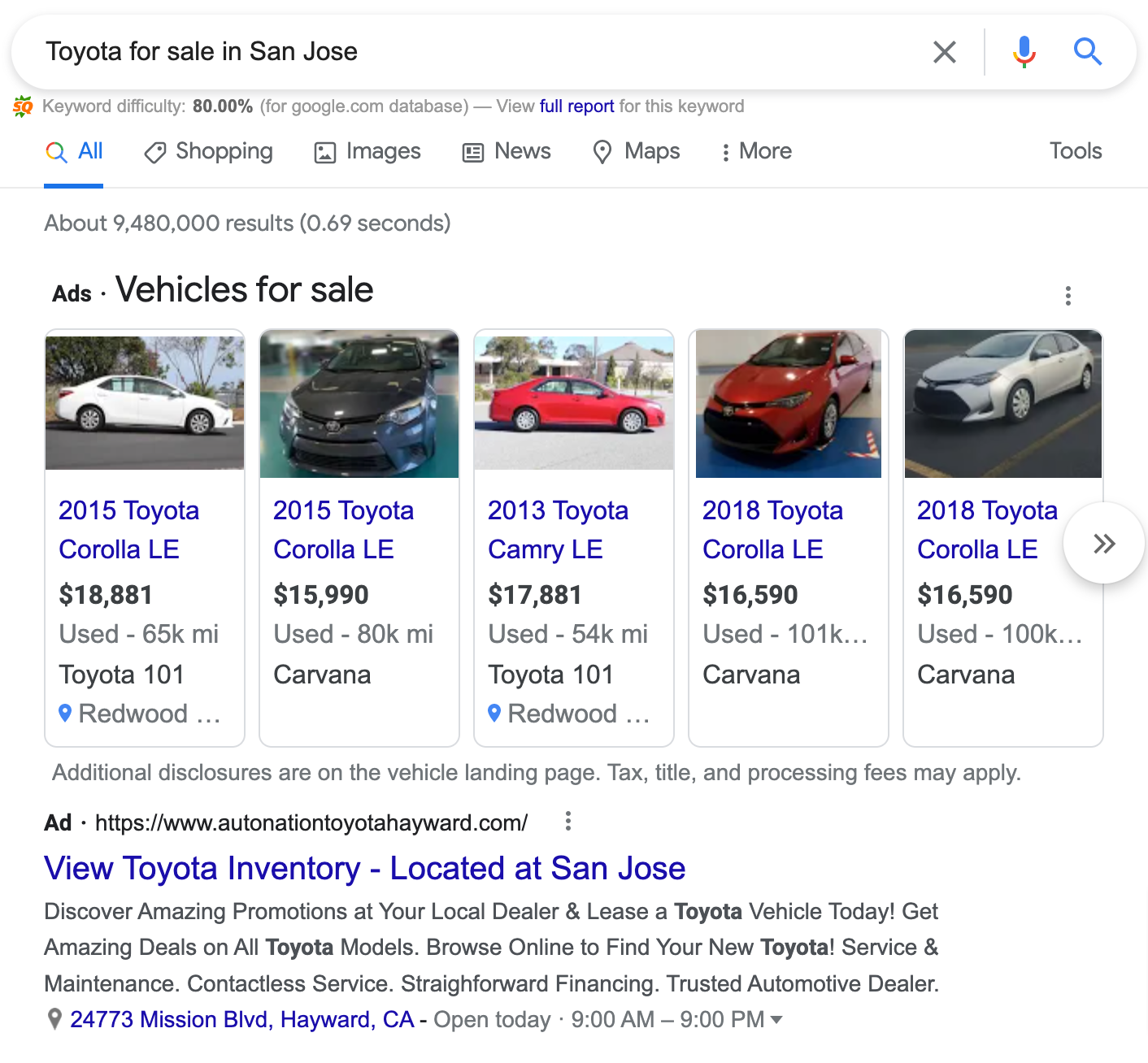
On the other hand, a search query like “best midsize sedans” is for someone a bit earlier on in the buying cycle. So may be better off as an “SEO keyword” that you optimize a blog post around.
Keywords are in many ways the foundation of your website.
For example, take a look at The Home Depot’s website. When we look at all of the keywords they rank for, you can instantly see what their website is about and the specific products they sell.
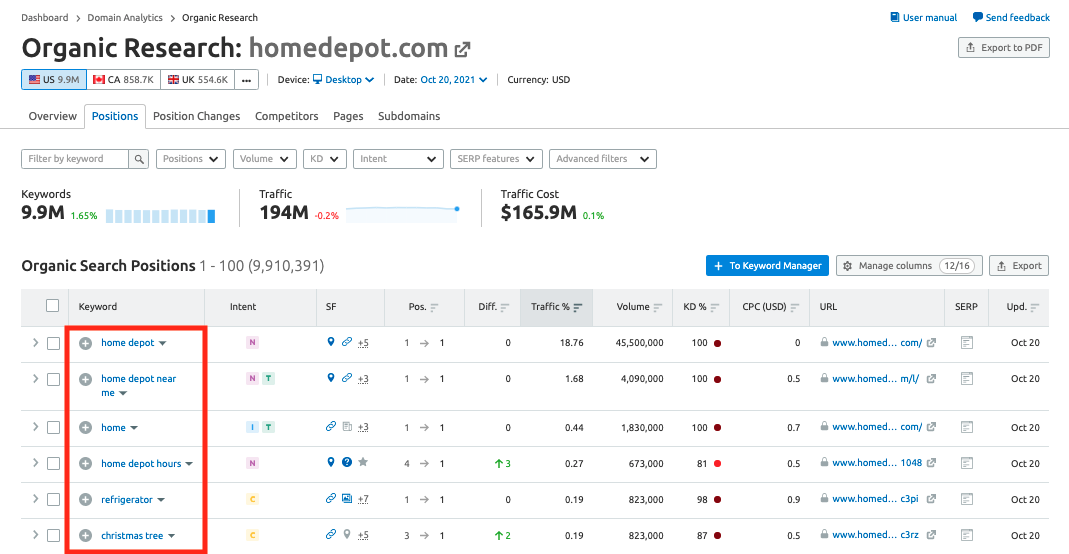
The question is: how do you find keywords that are right for your business? This process is known as keyword research. And we’ll cover that next.
How to Find Keywords for SEO
The keywords that you choose can make or break your SEO efforts.
If you choose keywords that are too competitive, you’ll have a hard time ranking in Google. And if you optimize your site around keywords that your customers don’t actually search for, you can end up with a lot of traffic that doesn’t convert.
This is why, if your site is relatively new, you probably want to focus your SEO efforts on long-tail keywords.
Long-tail keywords are search terms with relatively low search volume. But they tend to be very specific.
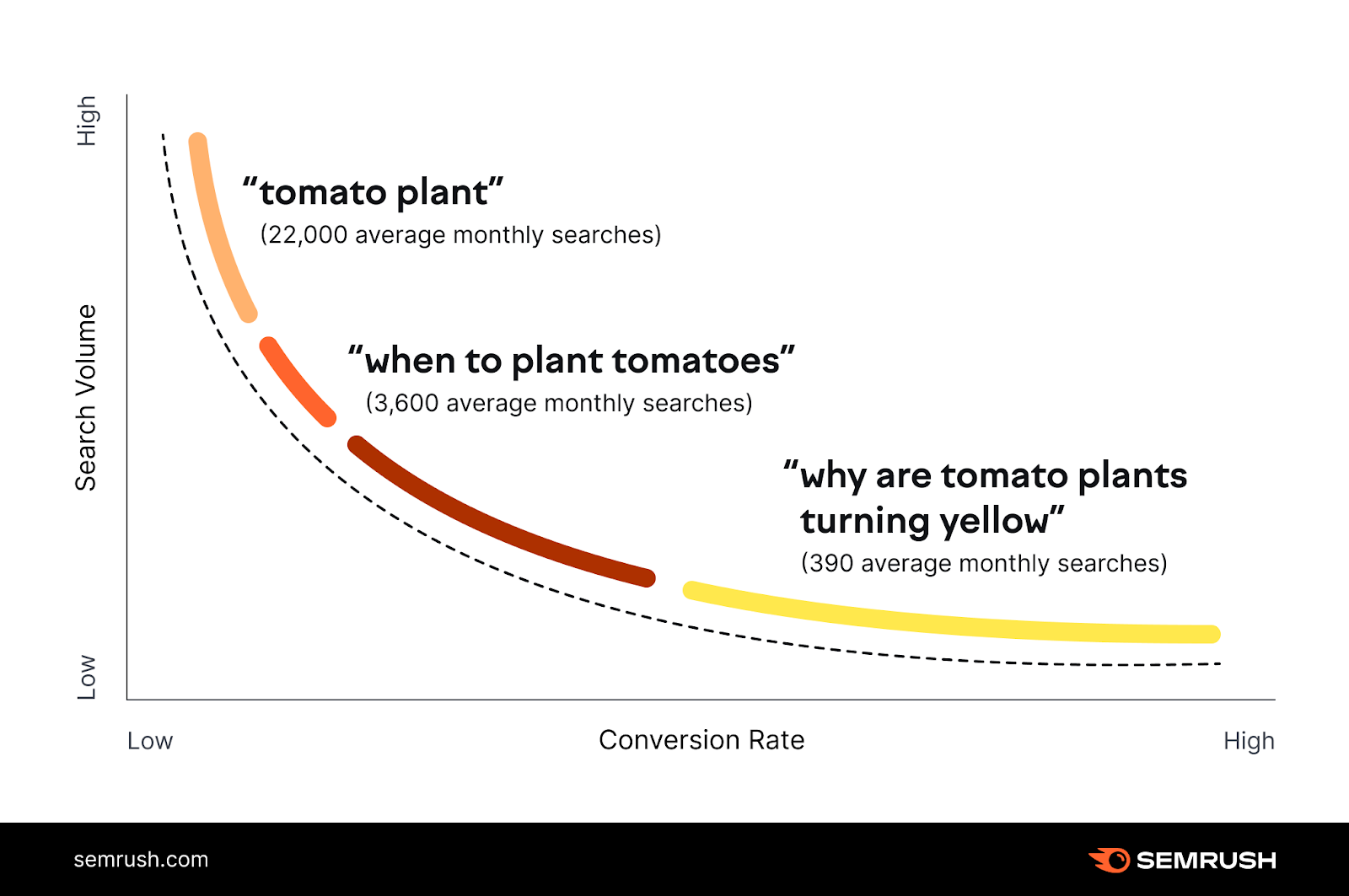
Worth noting: Long-tail keywords tend to convert at a much higher rate than high search volume terms.
Why? People using long-tail keywords are looking for something specific. Which means they’re likely farther along in their buyer journey and are more likely to convert.
For example, take a keyword like “Honda dealership in Chicago.”
According to Semrush, that term gets 320 searches per month (which isn’t a lot compared to more general keywords in this industry).
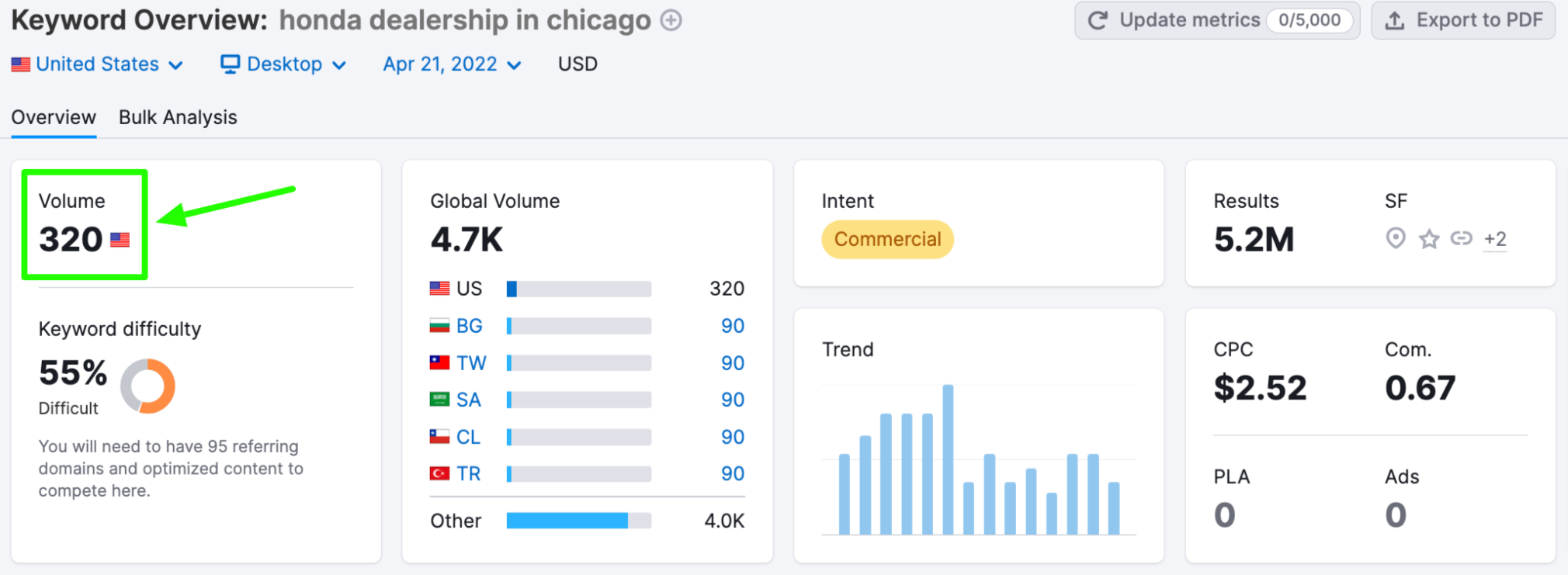
Also note how specific the keyword is (they’re not just looking for a “Honda dealership.” But a “Honda dealership in Chicago” specifically.)
That’s the type of long-tail keyword that’s perfect for a new website.
On the other hand, a term like “Honda dealership” gets a lot of search volume. But is much more difficult to rank for.
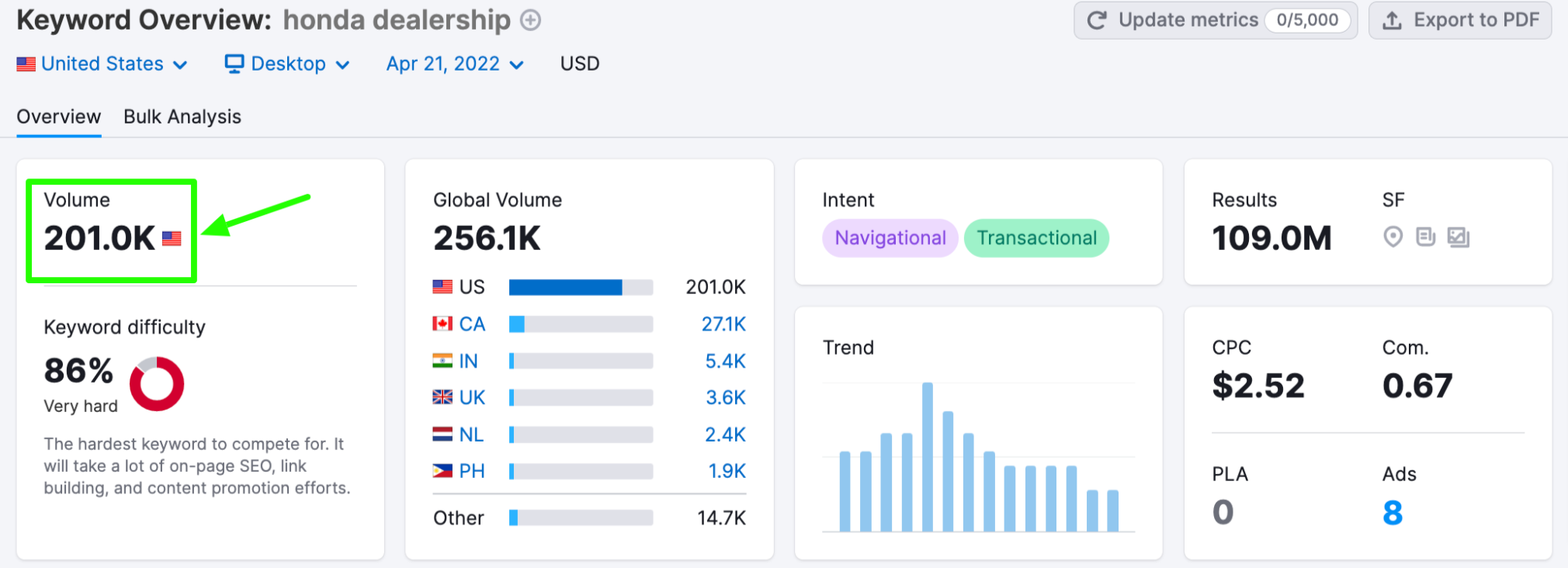
And being a more general term, “Honda dealership” likely won’t convert as well as the more specific “Honda dealership in Chicago” long-tail keyword.
Qualities of a Keyword
So when doing keyword research (and specifically, deciding which keywords to use), what are some of the qualities to pay attention to?
The main qualities of a keyword include:
Search volume Competition Price (cost-per-click) Word countSearch Volume
Search volume is the number of times a keyword is searched for in Google each month. Semrush measures this metric in average monthly searches by location.
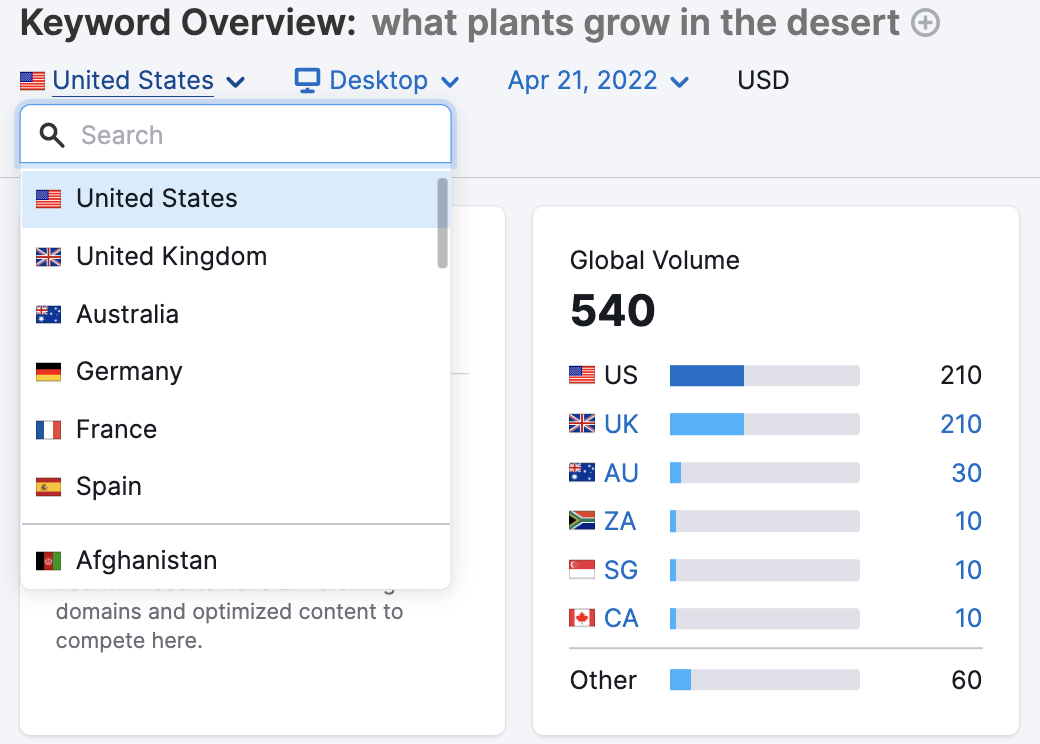
This metric is important because it helps you estimate how much potential traffic you could get by ranking for that keyword in Google.
For example, the keyword “what plants grow in the desert” had a volume of 210 monthly searches in the United States. You can see that it also has a global volume of 420 searches per month.
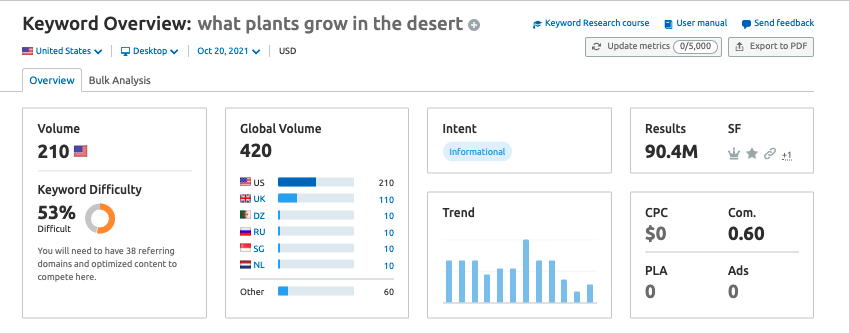
The keyword “loans” has a monthly search volume of 246.0k in the United States and a global volume of 850.8k.
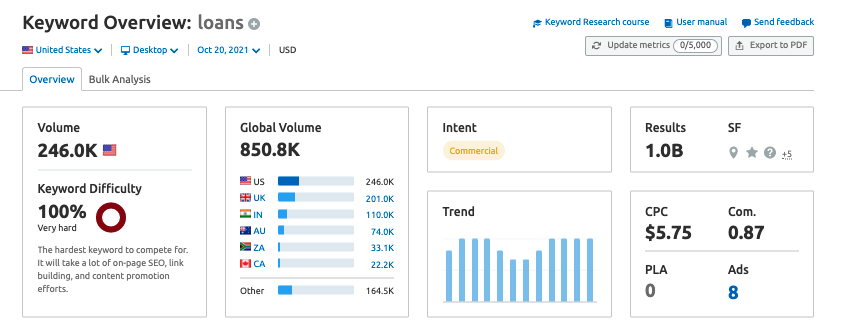
In March 2022, we updated our search volume algorithm to be even more accurate.
Investing in a keyword with lots of search volume has the potential to attract more visitors to your website. However, keywords with lots of searches also tend to be more competitive to rank for.
Which is why newer sites should try to optimize around relatively low-volume long-tail keywords whenever possible.
The reason? They’re less competitive and easier to rank for.
Competition
No matter how many searches a keyword gets, it’s important to also pay attention to that keyword’s competition. The more sought-after a keyword is, the more likely there will already be tons of websites vying for the top spot (both in the organic and paid results).
Most keyword tools have a way of measuring keyword competition. In Semrush, there are two metrics you can use to size up the competition on Google’s first page:
1. Keyword Difficulty: This metric tells you the level of effort it will take to rank in the top 10 organic results of Google for a keyword. This is based on the authority of the sites currently ranking on the first page of Google (as measured by backlinks).
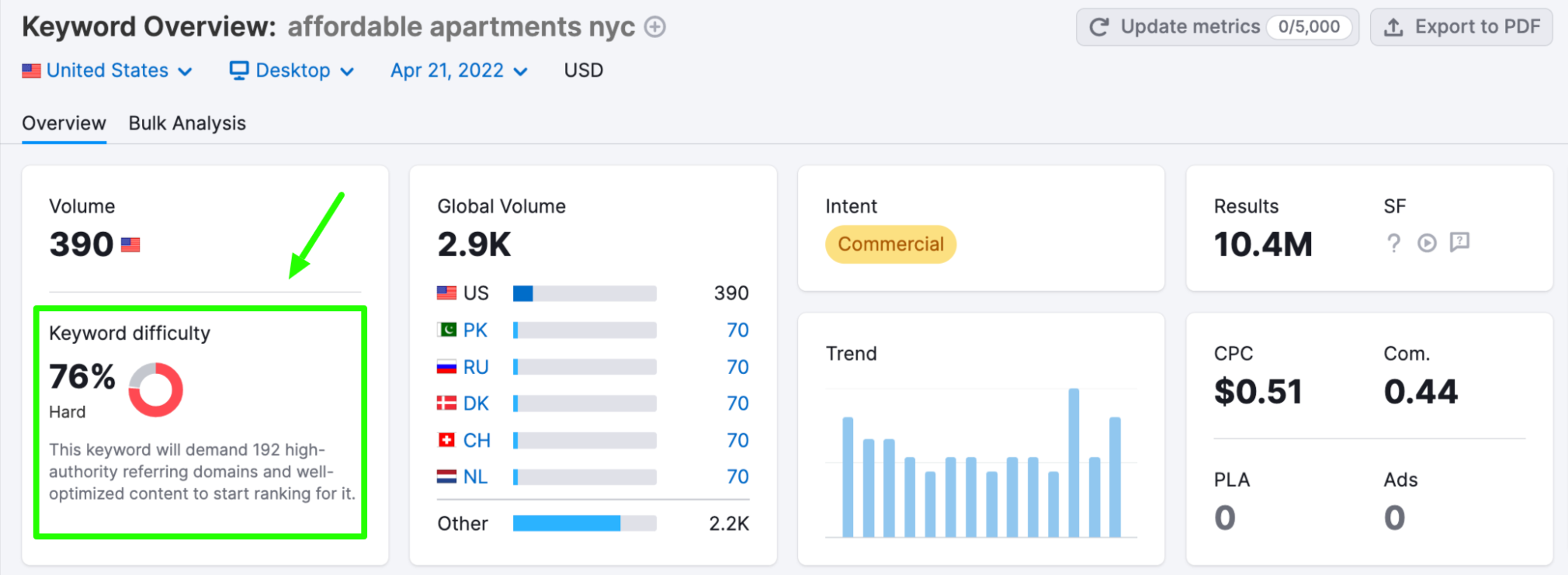
2. Competitive Density: This metric tells you how competitive (i.e., expensive) it is to rank an ad at the top of the search results. This is based on how many advertisers are bidding on a particular keyword.
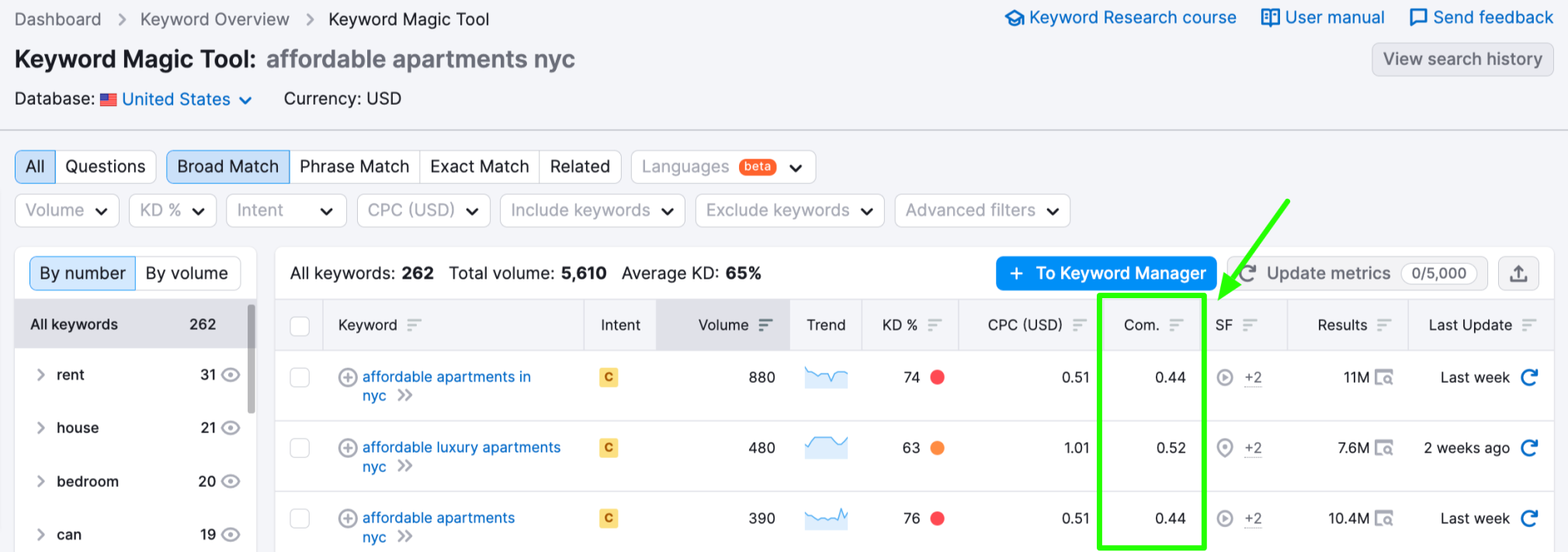
In general, Keyword Difficulty helps you manage your SEO campaign, and Competitive Density helps you prioritize your advertising campaign.
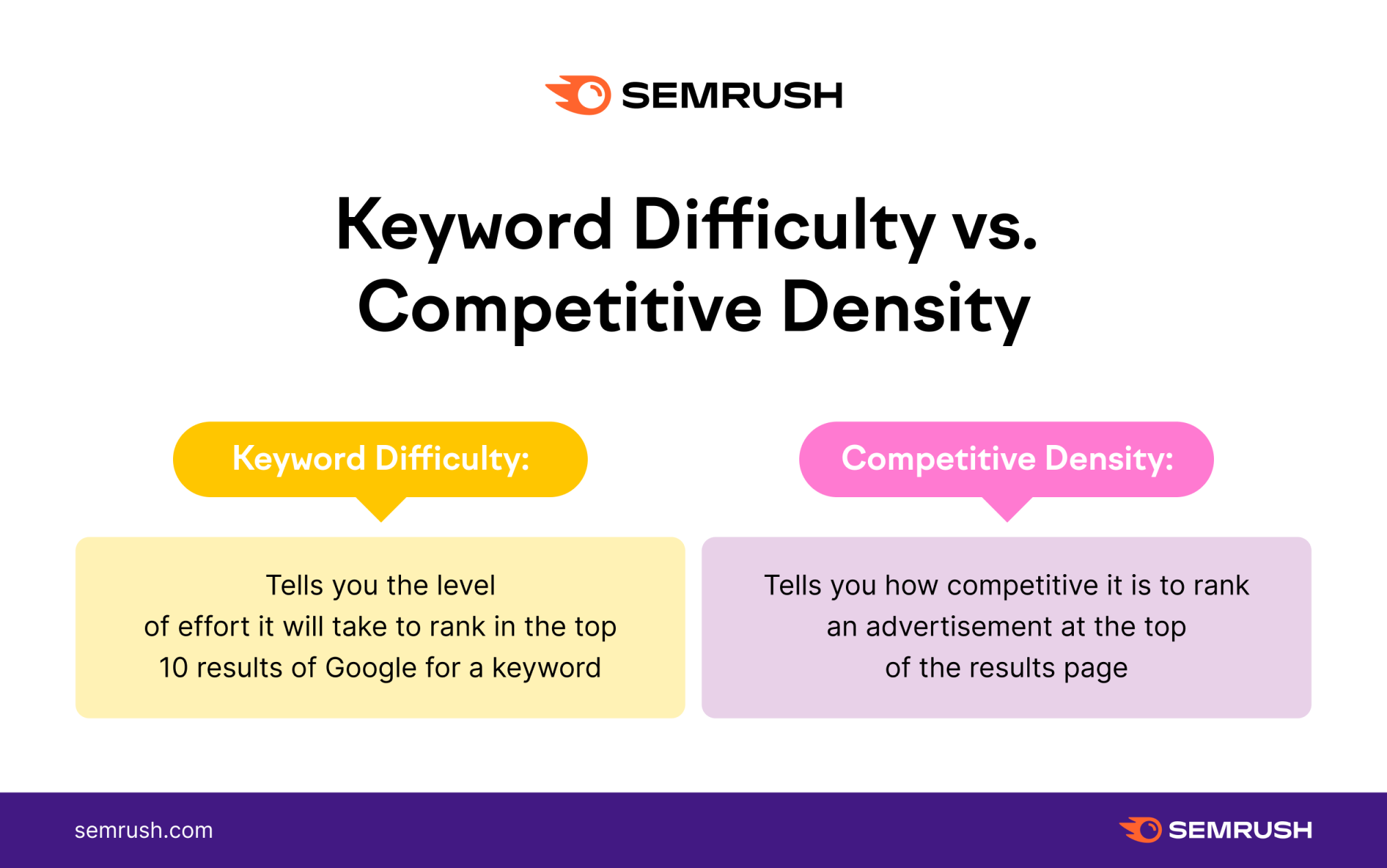
Price (Cost-Per-Click)
Speaking of advertising, every keyword has a price—a “cost per click” (CPC) that tells you how much it costs an advertiser every time a searcher clicks on their ad after searching the keyword.
For example, take the keyword “loans.” The CPC for that keyword is listed at $6.43.
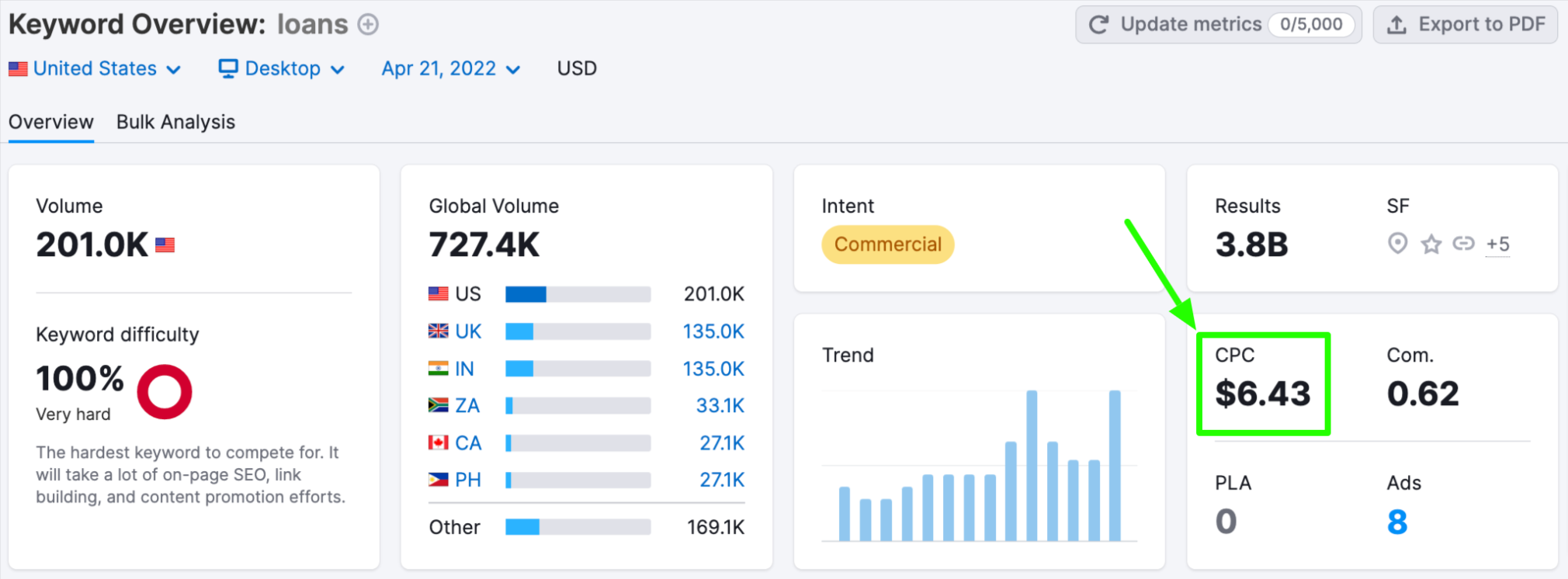
That means every time someone in the US searches “loans” on Google and clicks on an ad, the average price an advertiser pays is $6.43 in exchange for the website visitor.
When you’re planning an advertising campaign, evaluating the CPCs of your target keywords is important to estimate the cost of a campaign.
CPC also plays a role when it comes to choosing SEO keywords. Even though SEO traffic is “free,” certain keywords are more valuable to rank for than others.
For example, look at the CPC for the keyword “free divorce lawyer.”
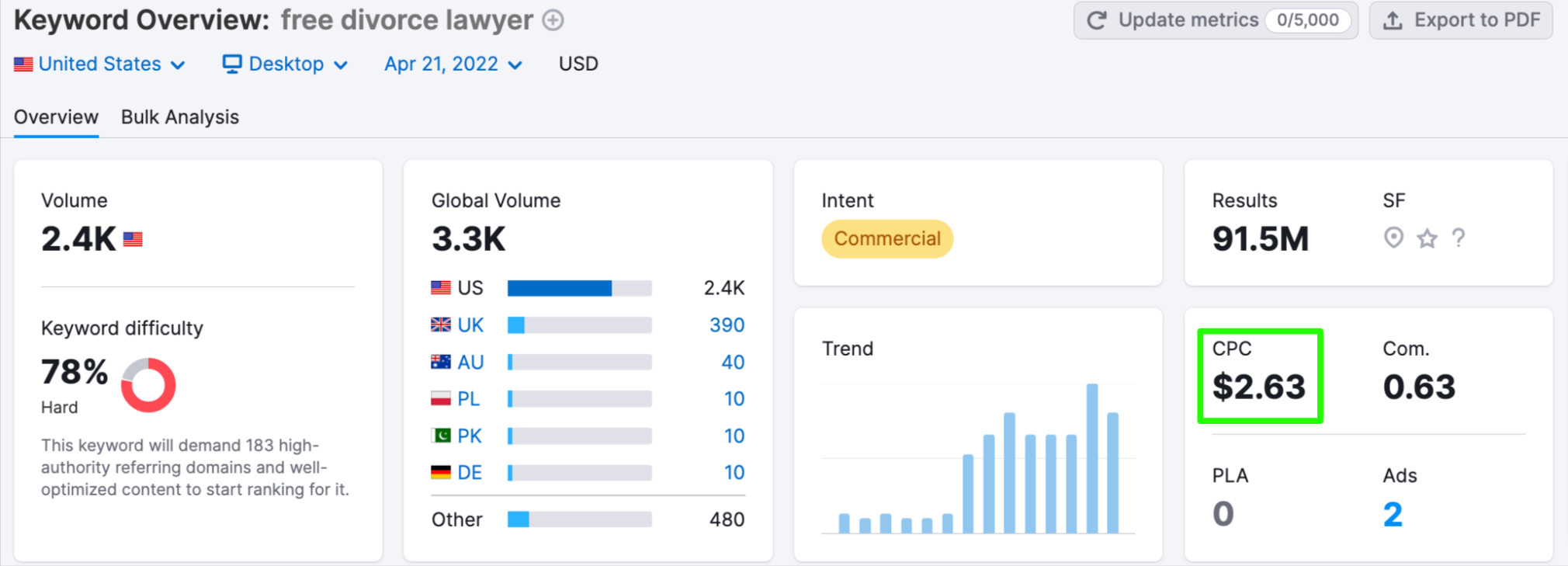
A visitor searching for this keyword is “worth” approximately $2.63. Which is fairly low. So even though the keyword may have decent search volume and doable competition for an authoritative enough site, visitor quality isn’t as great.
On the other hand, “divorce lawyer” is a related keyword with a much higher CPC: $10.05.
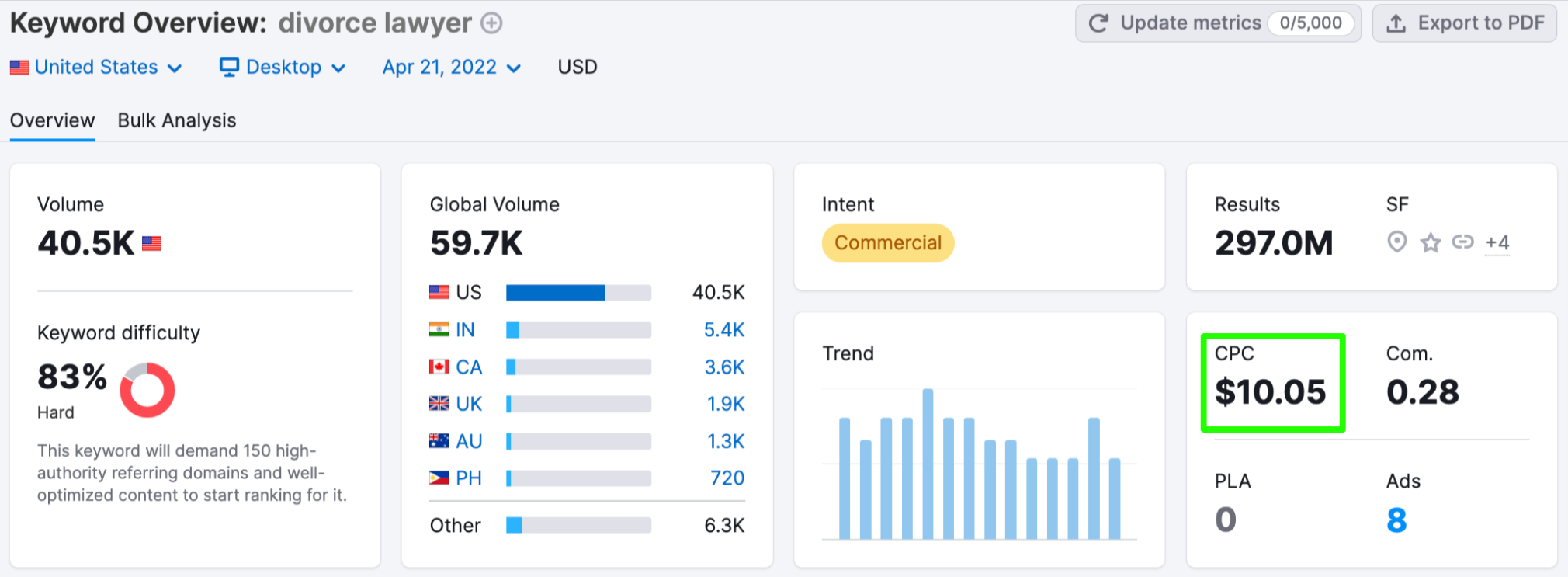
Which means a visitor that comes from Google after searching for that term is much more likely to become a customer (in fact, that’s why advertisers are tripping over themselves to bid on that keyword!).
That’s not to say that you should choose a keyword solely based on CPC. But it’s an important factor when it comes to choosing keywords in both SEO and PPC campaigns.
Word Count
Word count refers to the number of words that make up a single keyword. For example, the term “loans” has a word count of one, while “which plants grow in the desert” has six.
While looking for keywords in a keyword research tool, the search volume and the competitiveness of the query are often more important than the number of words that make up the keyword.
However, word count is still a helpful way to narrow your research.
Why? It’s simple: the higher the word count, the more specific the search query.
When a search query is long, the competition is usually relatively low. And the searcher is usually closer to making a purchasing decision.
For example, in a keyword research tool like the Keyword Magic Tool, you can filter a list of keywords by word count. For example, you can look at only keywords that have at least five words or more in them.

Why would you want to do this?
Well, you can find more specific queries (and long-tail keywords). For example, look at keywords related to “loans” that contain five or more words.
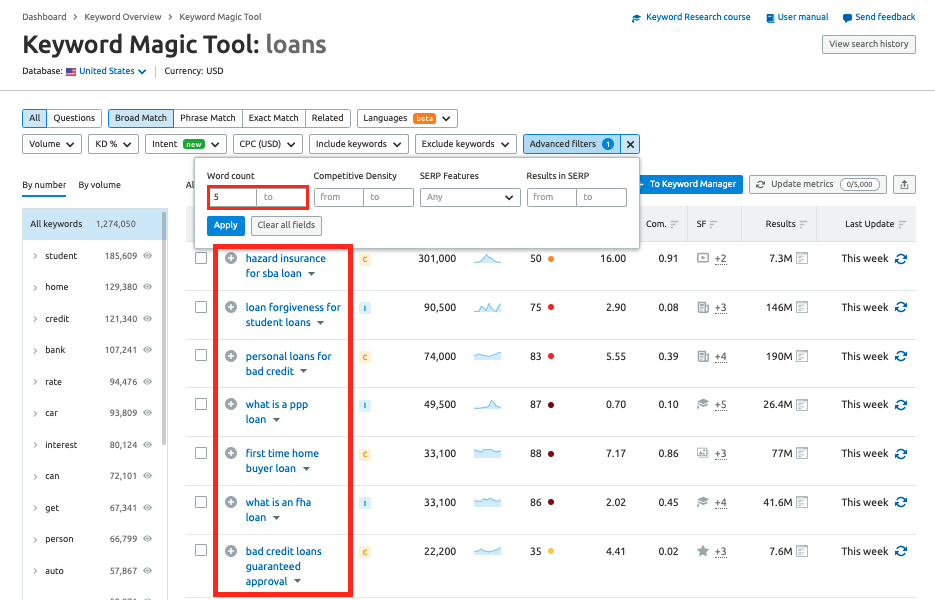
See how these keywords (like “first time home buyer loan”) are much more specific than the more general term “loans?? That usually means those folks are more likely to convert once they land on your website.
Also note that the keyword difficulty for these terms is much lower than “loans.” Yet another benefit of focusing on longer terms!
Keyword Search Intent
Search intent tells you where the user is in their journey.
Intent is determined by a few questions:
Are they searching with the intent to buy something? Are they simply looking for a definition? Are they shopping around to gather information and see their options but don’t want to purchase yet? Are they looking to navigate to a website or webpage they already know?Based on these four questions, search intent generally falls into four main categories:
Transactional (buyer) intent Commercial intent Navigational intent Informational intentSemrush makes it easy to identify the intent of any keyword in our database. Just look for the dedicated column in any keyword report.
Here’s an example of search intent in the Keyword Magic Tool:
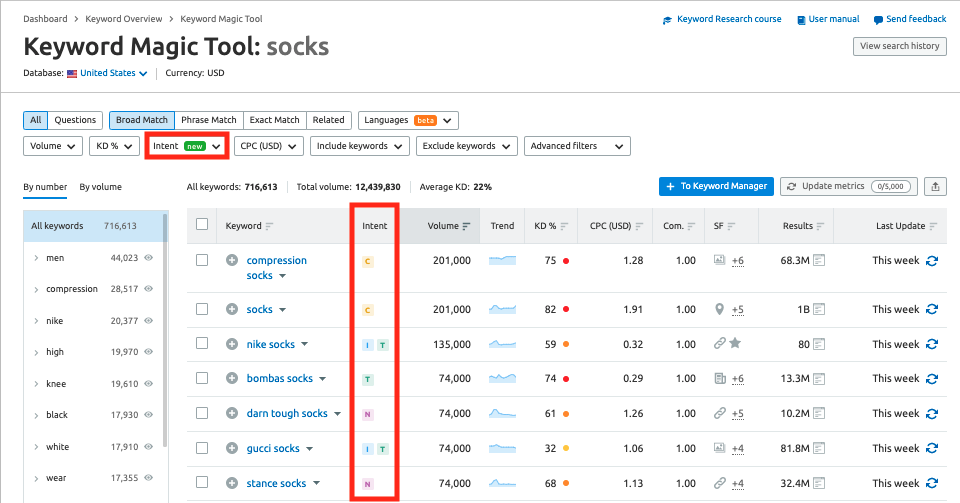
Transactional
Transactional queries represent a strong intention to make a transaction on a website.
Examples of transactional queries include:
Buy air force 1 online Summer dress under $100 Where can I sign up for cheap flight alerts Car insurance quotesTransitional queries can include words like “buy,” “subscribe,” “for sale.” As a rule, these keywords are more specific as well. They may even describe your product or service exactly, like “neon blue unisex watch.”
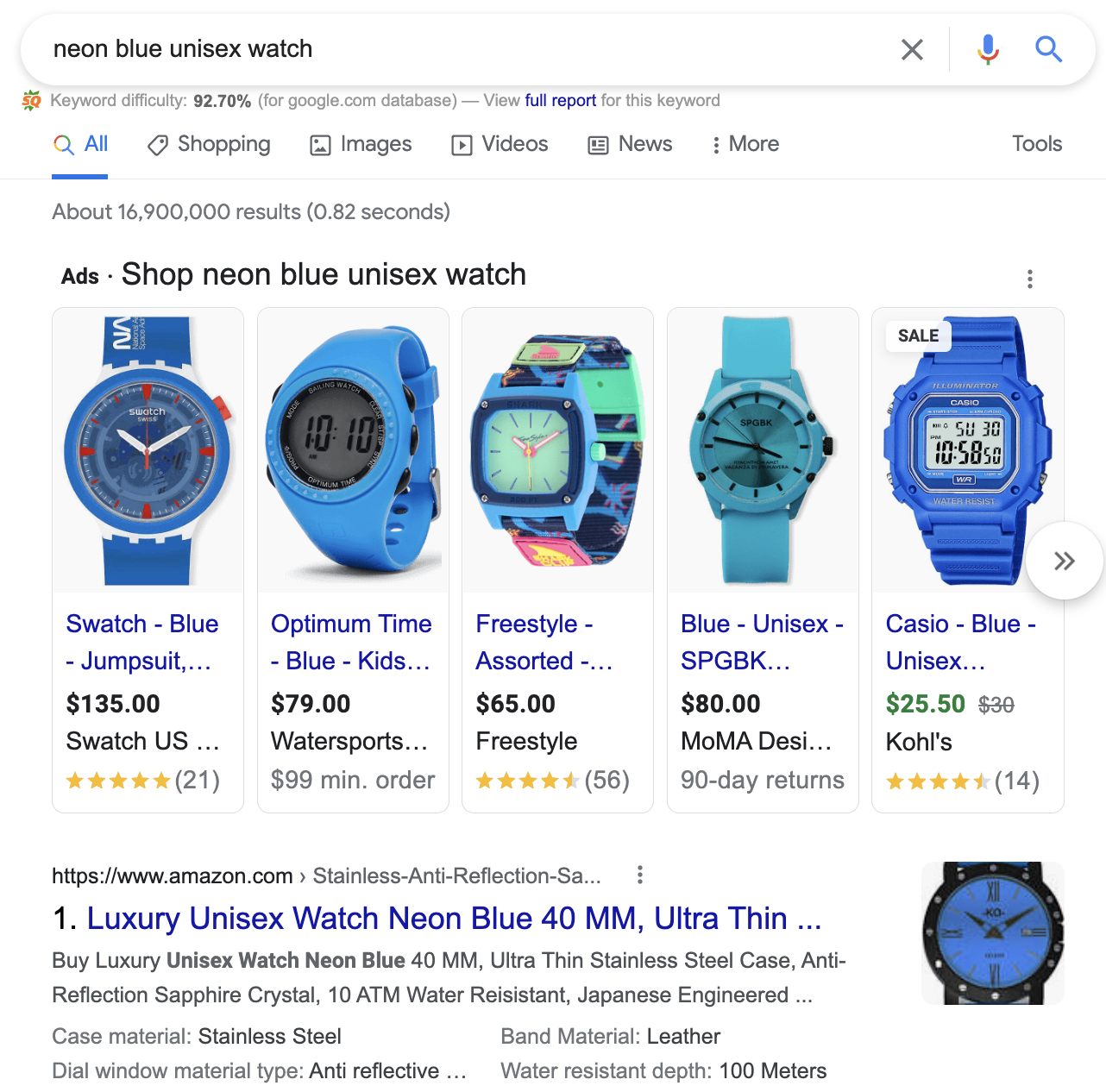
Related reading: What Are Buyer Keywords and How Do I Find Them?
Commercial
Commercial intent usually means users are researching products, services, or brands prior to shopping. They aren't ready to buy just yet. But they’re likely to make a purchase soon.
Examples:
Best running shoes Best shoes for dog walking Types of dog harnesses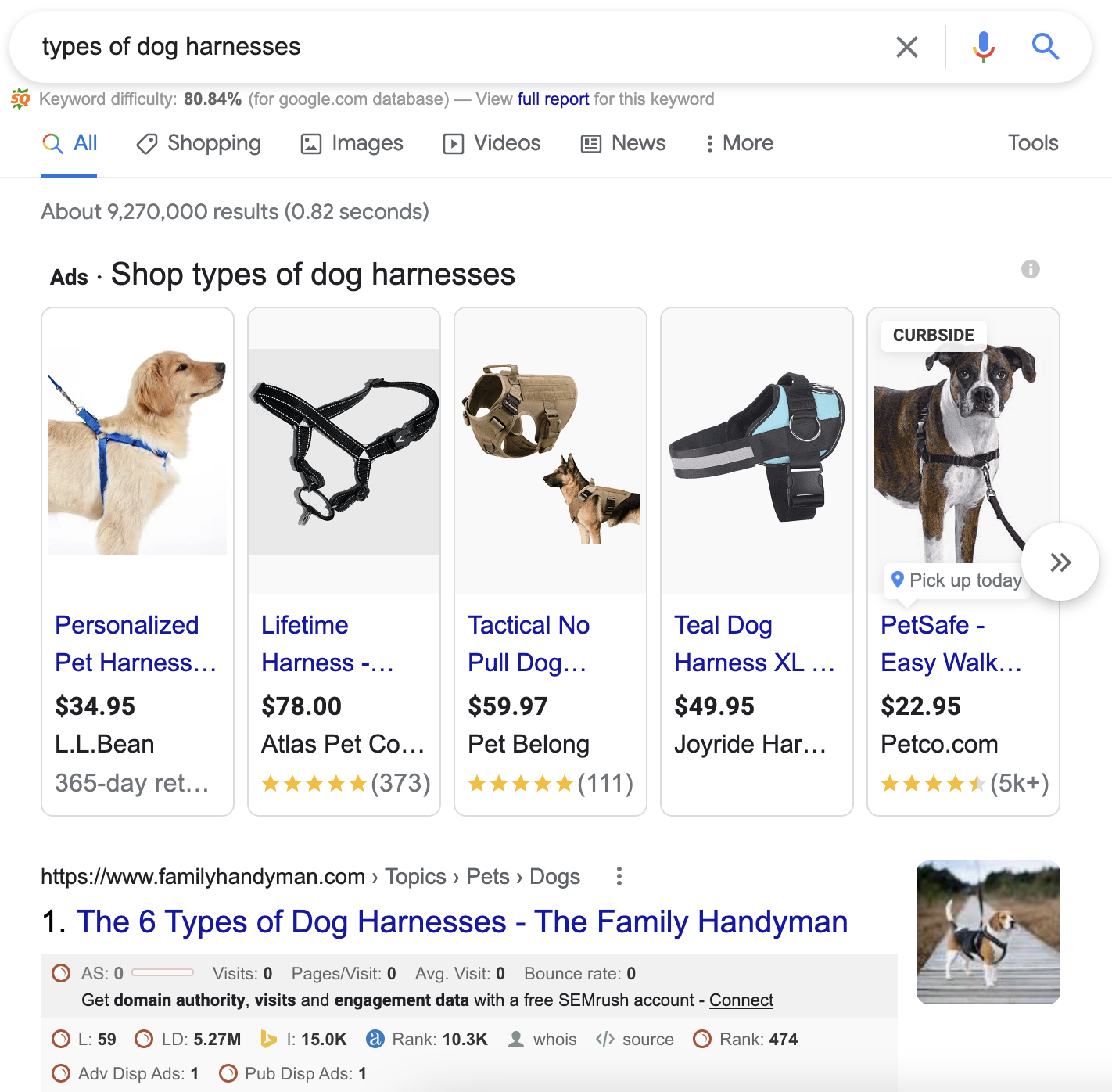
Even though users that search with commercial intent keywords may not plan to buy something right away, it’s still a great time to get in front of them. That way, when they are ready to buy, your business is top of mind.
Informational
Informational queries look for directions, facts, or knowledge without an explicit intention to make a transaction related to the search.
Examples:
Where is Machu Pichu How long does it take to boil water What does stereo mean How to rank higher in GoogleInformational queries typically mean that the user is looking to solve a problem.
While these keywords aren’t likely to give you a good ROI from advertising, targeting them with SEO can make sense.
For example, one of our best-performing keywords (in terms of organic traffic) is our list of the world’s most popular websites.

According to our data, this single page brings in 101.1k visitors from Google each month.

However, this is very much a keyword with informational intent. Very few of the people that visit us via that keyword are going to sign up for our software right away.
But that traffic is still valuable. We’re getting our brand in front of tech-savvy folks.
Also, some of this traffic signs up for our newsletter and follows us on social media. That way, we’re top of mind when someone is ready to invest in marketing software
Navigational
Navigational queries indicate an intent to navigate to a specific website or piece of content.
Examples:
Doug the Pug Instagram Bank of America login Try Guys YouTube channelThese searches are great to rank for if you happen to be the brand someone is searching for. Otherwise, navigational keywords usually don’t make sense to target.
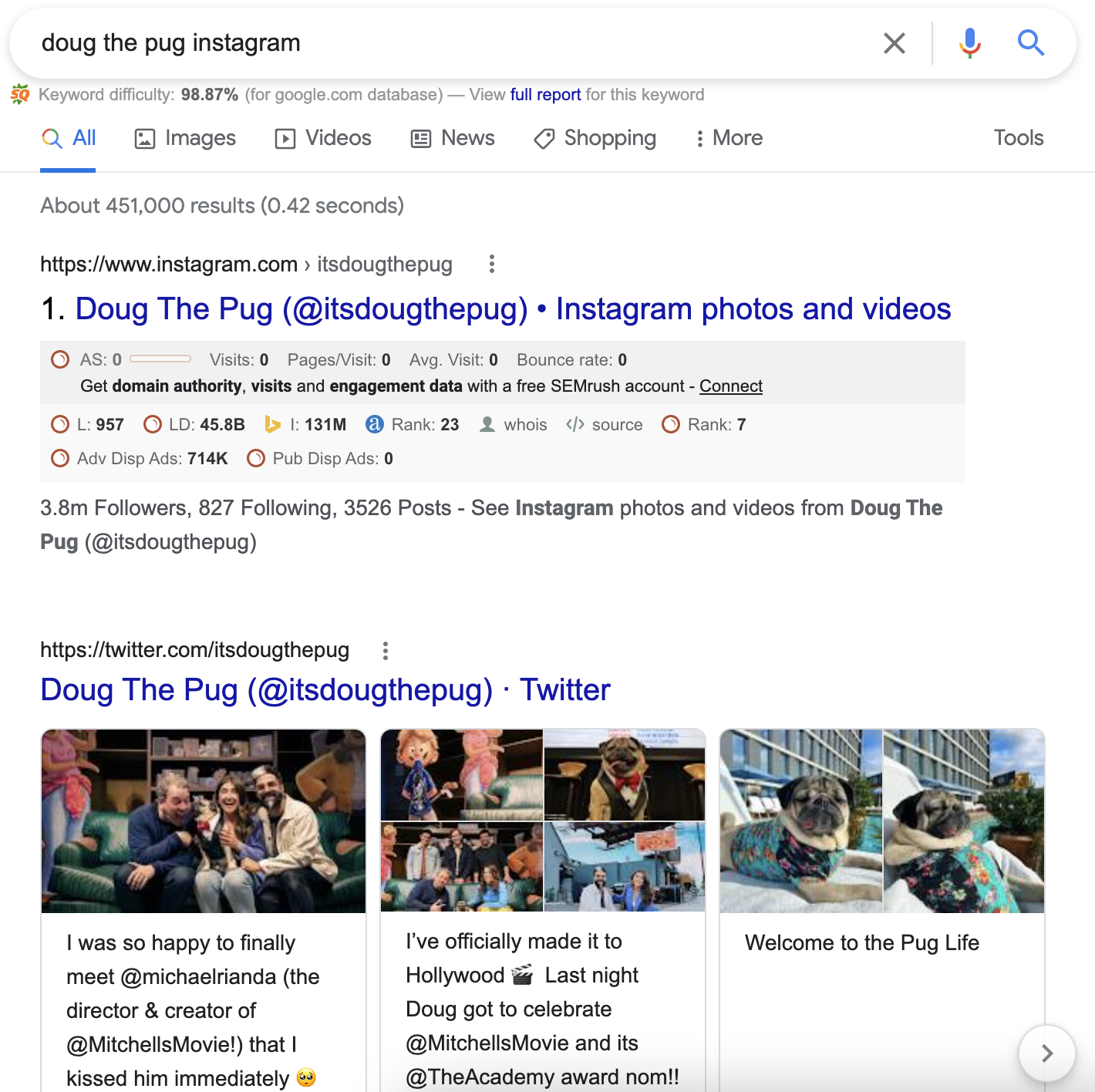
Types of Keywords
As you just saw, keywords can have different search intents. But there are also a few different keyword types worth knowing.
These types of keywords include:
Branded keywords Geo-targeted keywords Negative keywordsBranded Keywords
Branded keywords are keywords that include a specific brand name.
Examples of branded keywords include:
“Adidas tracksuit for sale” “Semrush pricing” “Chewy discount code”Geo-targeted Keywords
Geo-targeted keywords include a geographic location such as “dentist Philadelphia” or “restaurants in Chicago.”
These are great targets for local businesses that serve a specific geographical area.
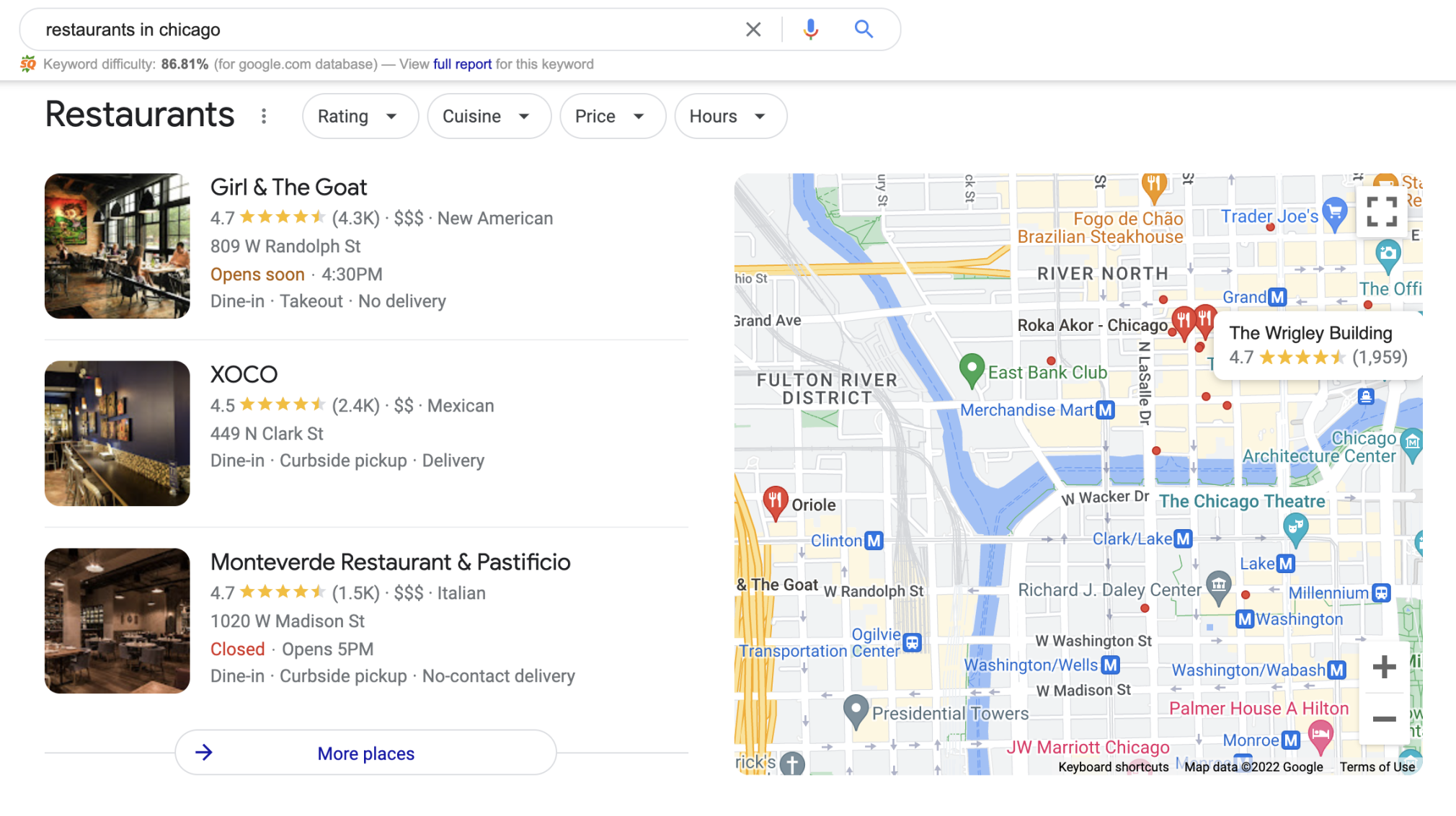
Negative Keywords
Negative keywords are terms that you don’t want to use in your Google Ads campaign.
For example, by adding the word “free” as a negative keyword, you will tell Google Ads not to show your ads to any searchers using the word “free” in their query.
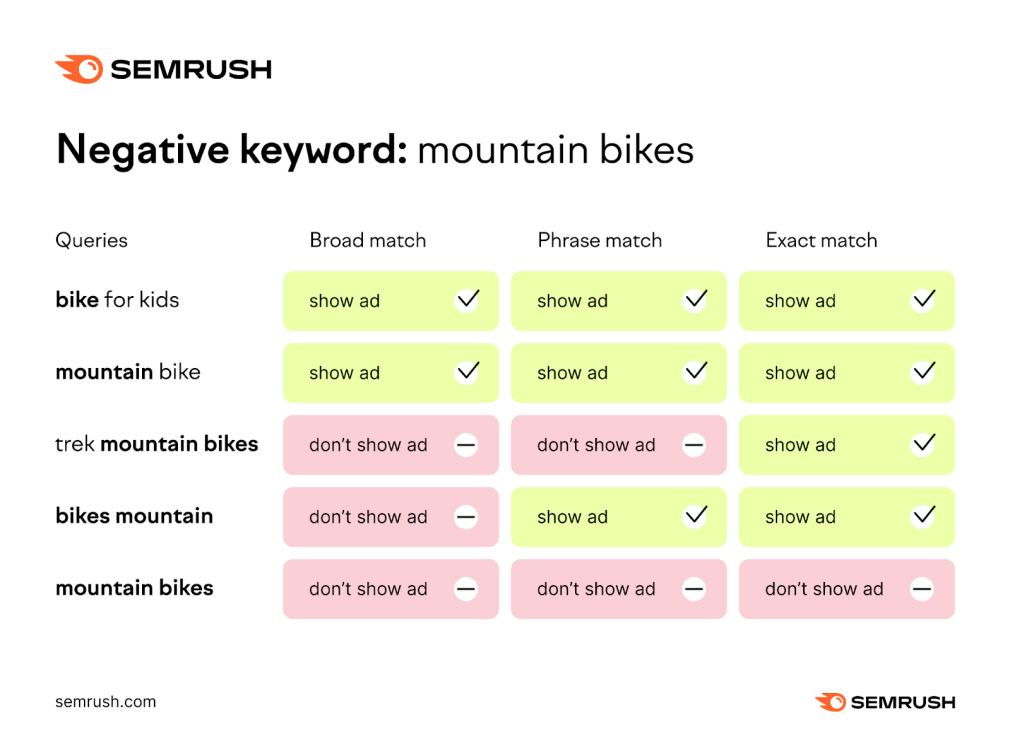
If you choose keywords to bidon in Google Ads, why would you need to specify negative keywords?
Well, Google Ads allows you to specify keywords as “broad match.” This means Google might show your ad for your exact keyword, along with variations.
For example, you may want to bid on the keyword “best toasters.” If you’re set up for broad match, Google may display your ads when people search for “best toasters under $20” and “best toasters for bagels.”
Which is where negative keywords come in. They allow Google to display your ad for related queries. But not for queries that you specifically don’t want to bid on.
Choosing SEO Keywords vs. PPC Keywords
Choosing your target keywords defines your online strategy and determines the type of people that are going to visit your website.
You’ll typically want to target many of the same keywords for SEO or PPC campaigns. But not always.
Here are some guidelines for choosing keywords that are best for SEO vs. those ideal for PPC.
Keywords Ideal for SEO:
Informational keywords (“how to do X,” “what is X”) Keywords that have low competition in the SERPs “Low hanging fruit keywords:” terms with high buyer intent but low competition Keywords that your target customer uses when they’re not searching for exactly what you sell Keywords where your team could provide unique value via a blog postKeywords Ideal for PPC:
Keywords with fairly focused buyer intent (“Marketing software”) Keywords where someone is searching for your exact product (“Keyword research tool”) Branded keywords that include you or a competitor (“Nike shoes” or “Adidas shoes”)How to Use Keywords
Here are a few best practices to keep in mind as you optimize your content around specific keywords:
Avoid keyword stuffing Use keywords naturally Focus on long-tail keywords with reasonable competition Learn where to place keywords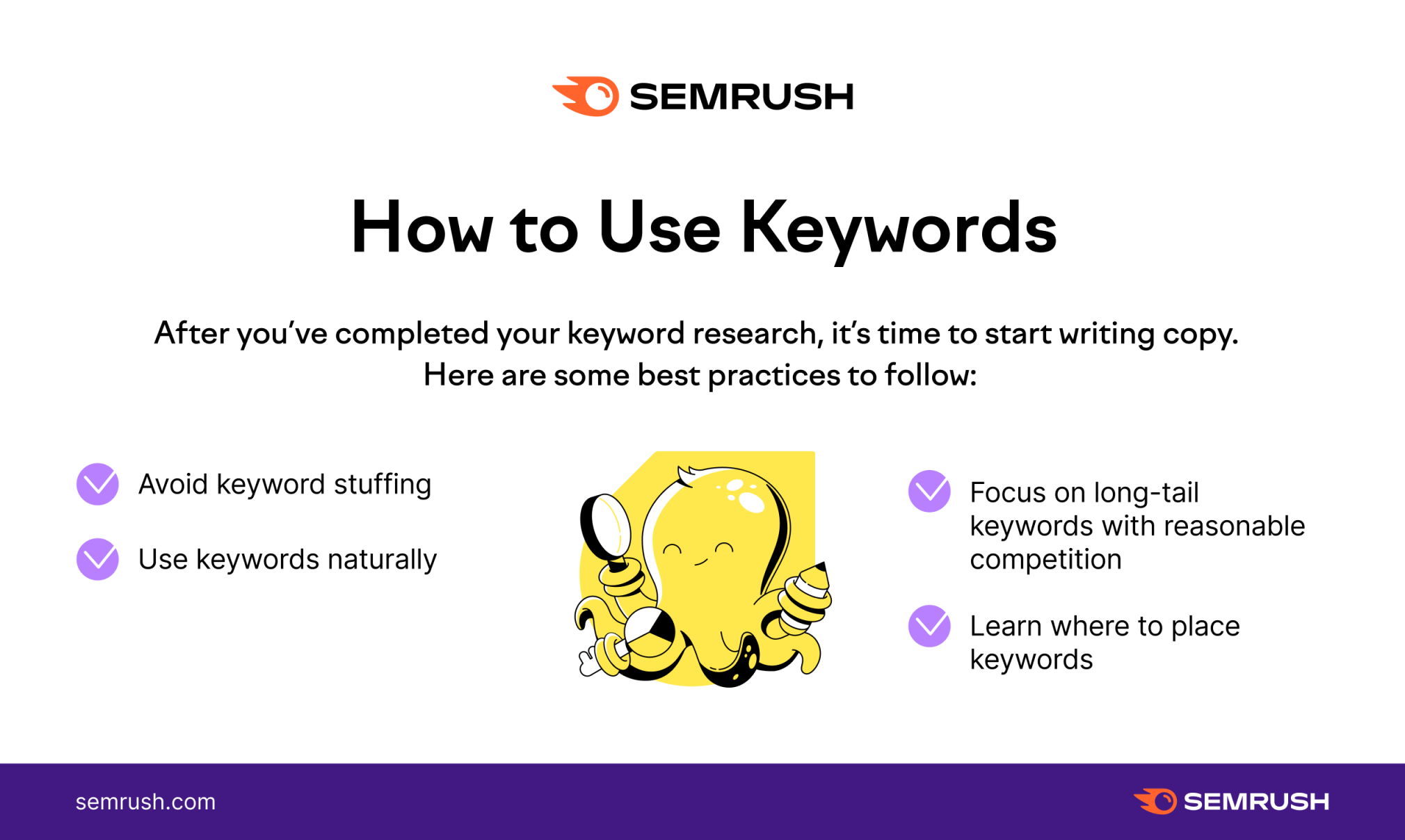
Avoid Keyword Stuffing
Keyword stuffing is when you use your target keyword too frequently in your content.
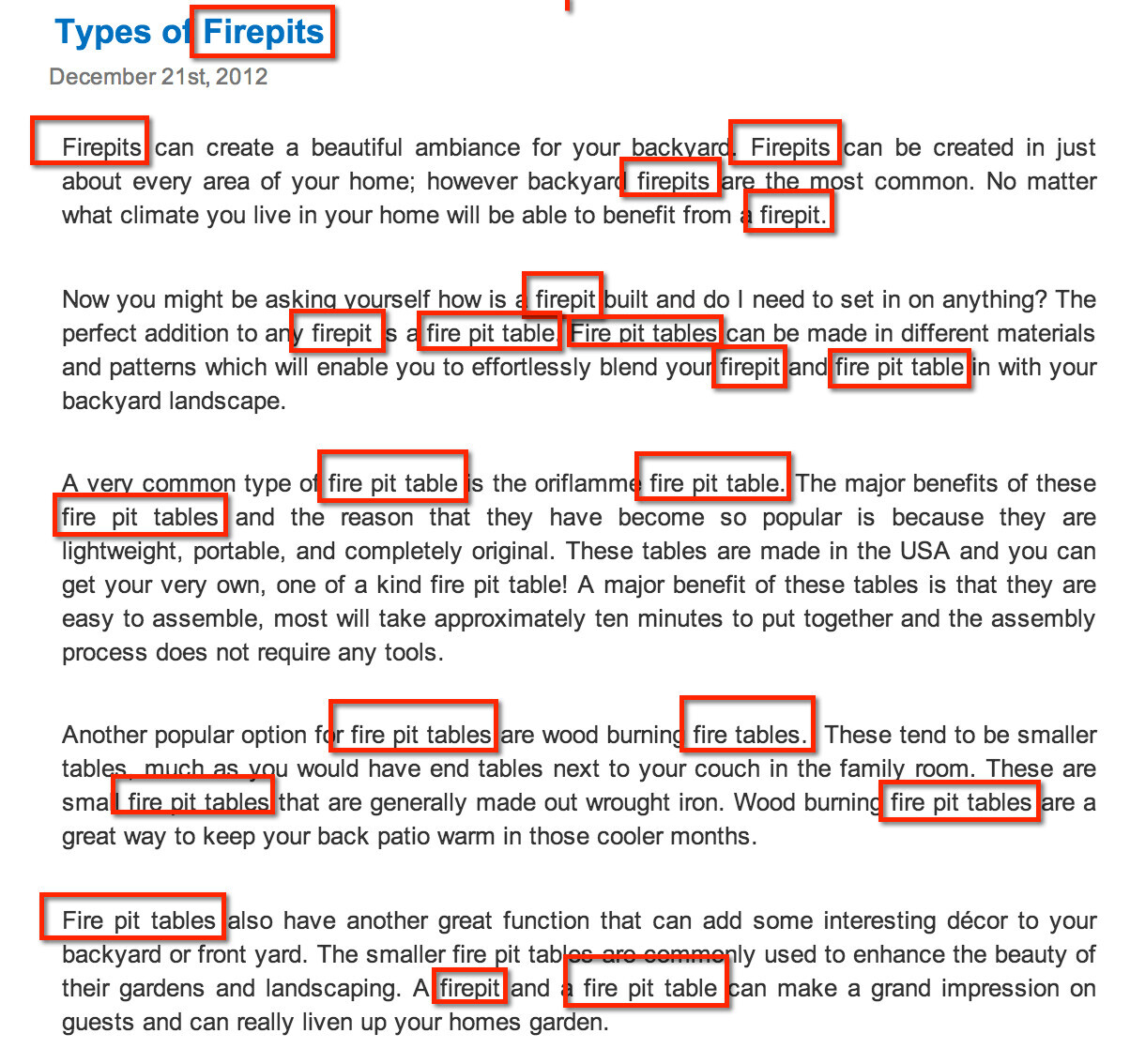 Image courtesy of contentwriters.com
Image courtesy of contentwriters.comIf you write naturally, you probably don’t need to even worry about keyword stuffing. You’ll include your target keyword (and related keywords) naturally.
So in general, you don’t need to use your keyword too many times in your content.
Google is smart: if you use your keyword in your title tag, your URL, and throughout the page, they’ll easily figure out what your page is all about.
The same rule goes for incorporating more “awkward” keywords into your text.
In this example, the top result for “hotels Chicago” incorporates “in” as a stop word, but still ranks at the top of the page.
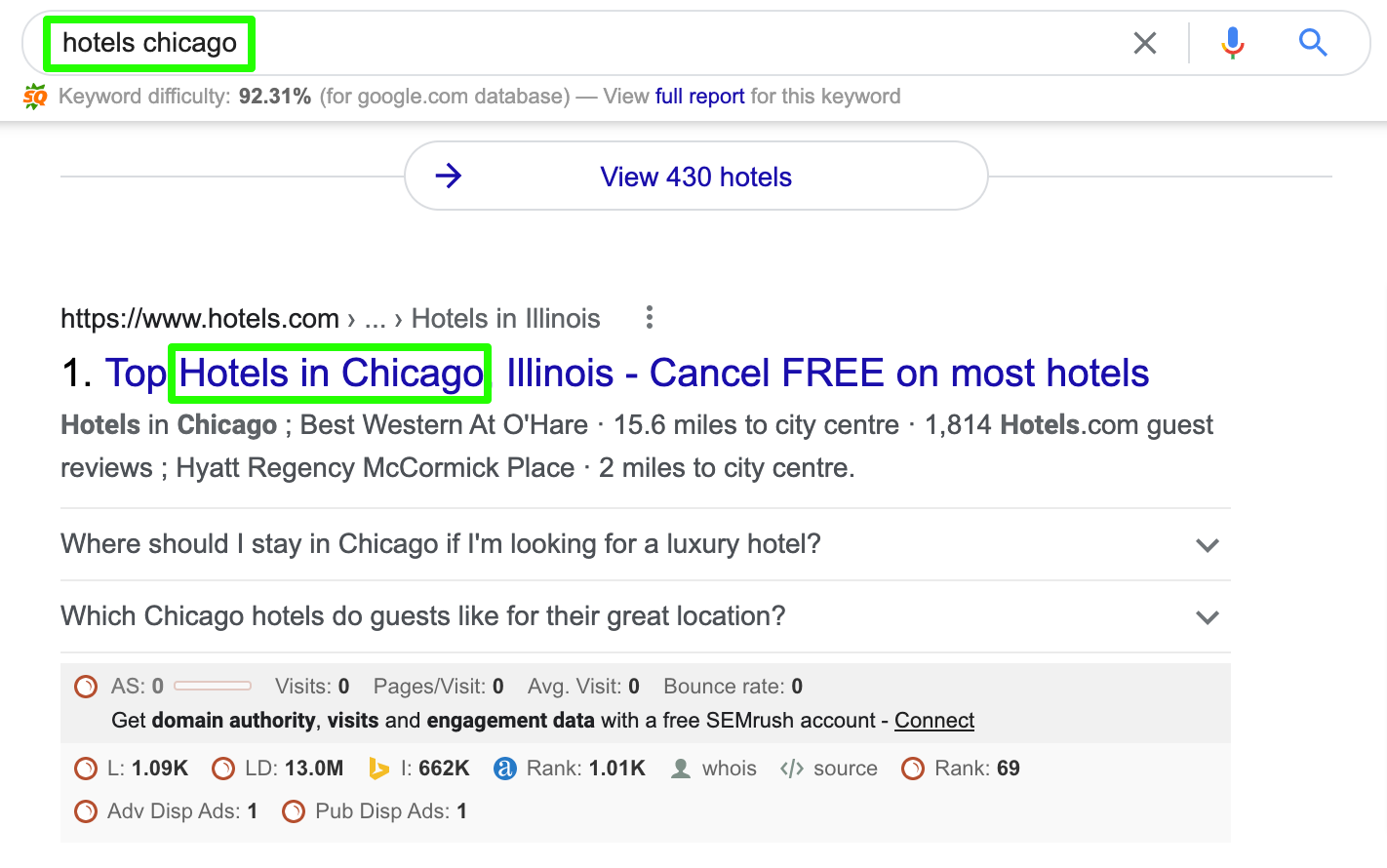
When it comes to using keywords in your content, a good rule to follow is: “sprinkle, don’t spam.”
Here’s an example:
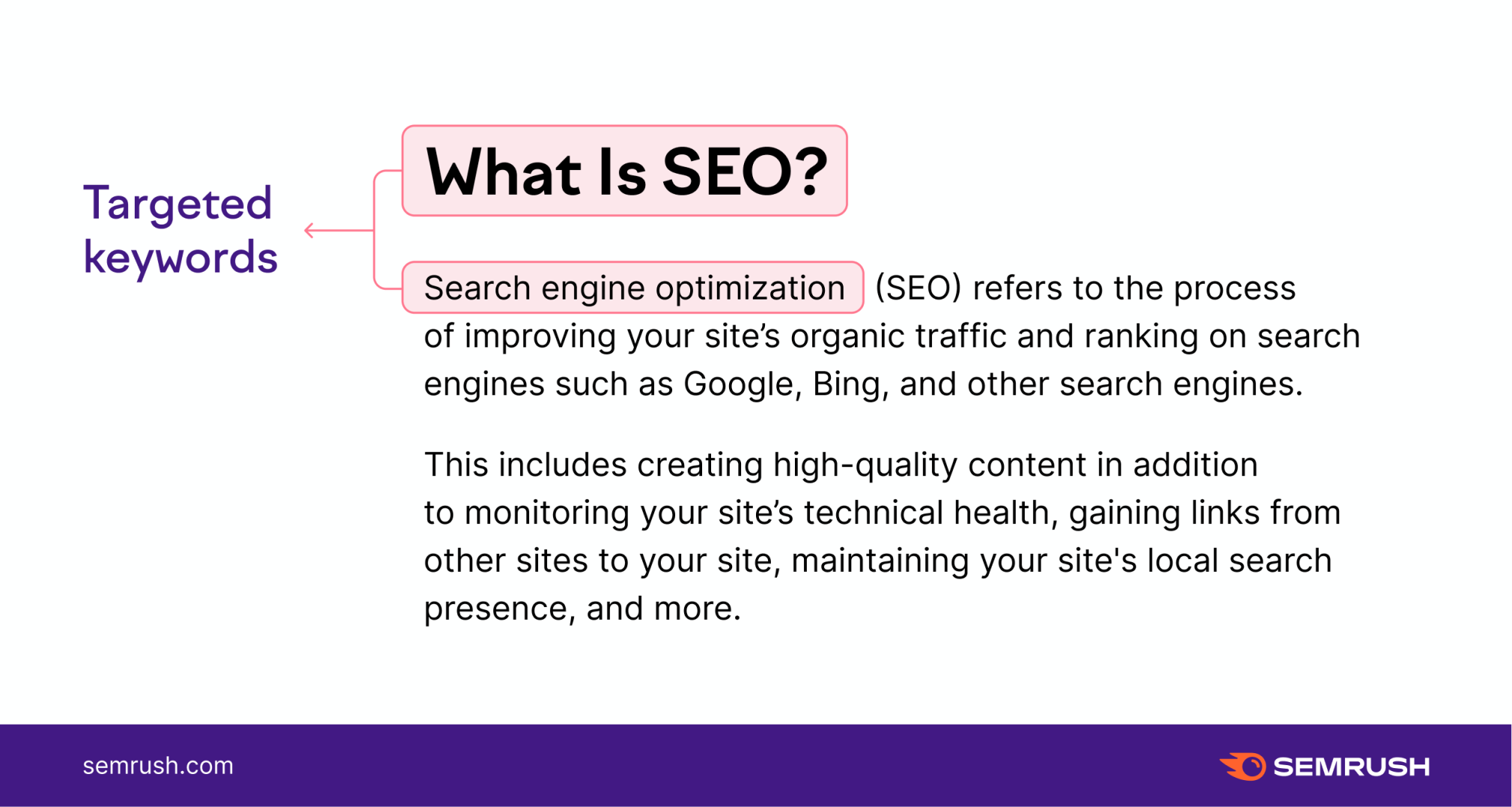 While the targeted keywords for this example appear right off the bat, they don't feel spammy or forced.
While the targeted keywords for this example appear right off the bat, they don't feel spammy or forced.Use Keywords Naturally
Avoiding keyword stuffing is a good start. But what does it mean to use keywords naturally?
Here’s an example:
Let’s say that during the keyword research process you discover the keyword phrases: “coffee shop near me.”
This particular keyword is difficult to use naturally. For example, you would not start a blog post with “Looking for a coffee shop near me?”
How about another example: the keyword “jacuzzi hot tubs.”
According to Semrush, that term gets searched for 9.9k times every month.
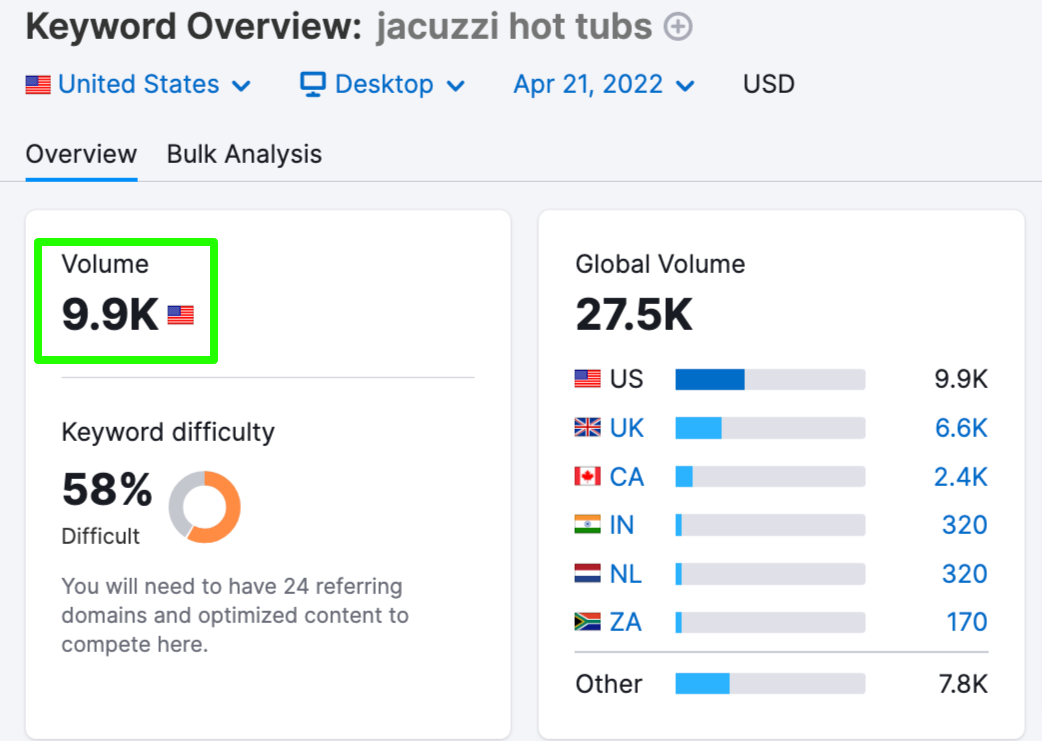
Unfortunately, the syntax for that keyword is a little strange. Which makes it difficult to use naturally in an article or landing page.
In other words, your blog post title shouldn’t be something like: “10 Best Jacuzzi Hot Tubs.”
It’s just not natural.
Instead, use a version of the keyword that reads well. In this example, you could use “10 Best Jacuzzis and Hot Tubs.”
Google is smart enough to know that your article “10 Best Jacuzzis and Hot Tubs” is a good match for the search term “jacuzzi hot tubs.”
In fact, if you look at the SERPs for the term “jacuzzi hot tubs,” you’ll notice that none of the top 10 results uses the exact phrase “jacuzzi hot tubs:”
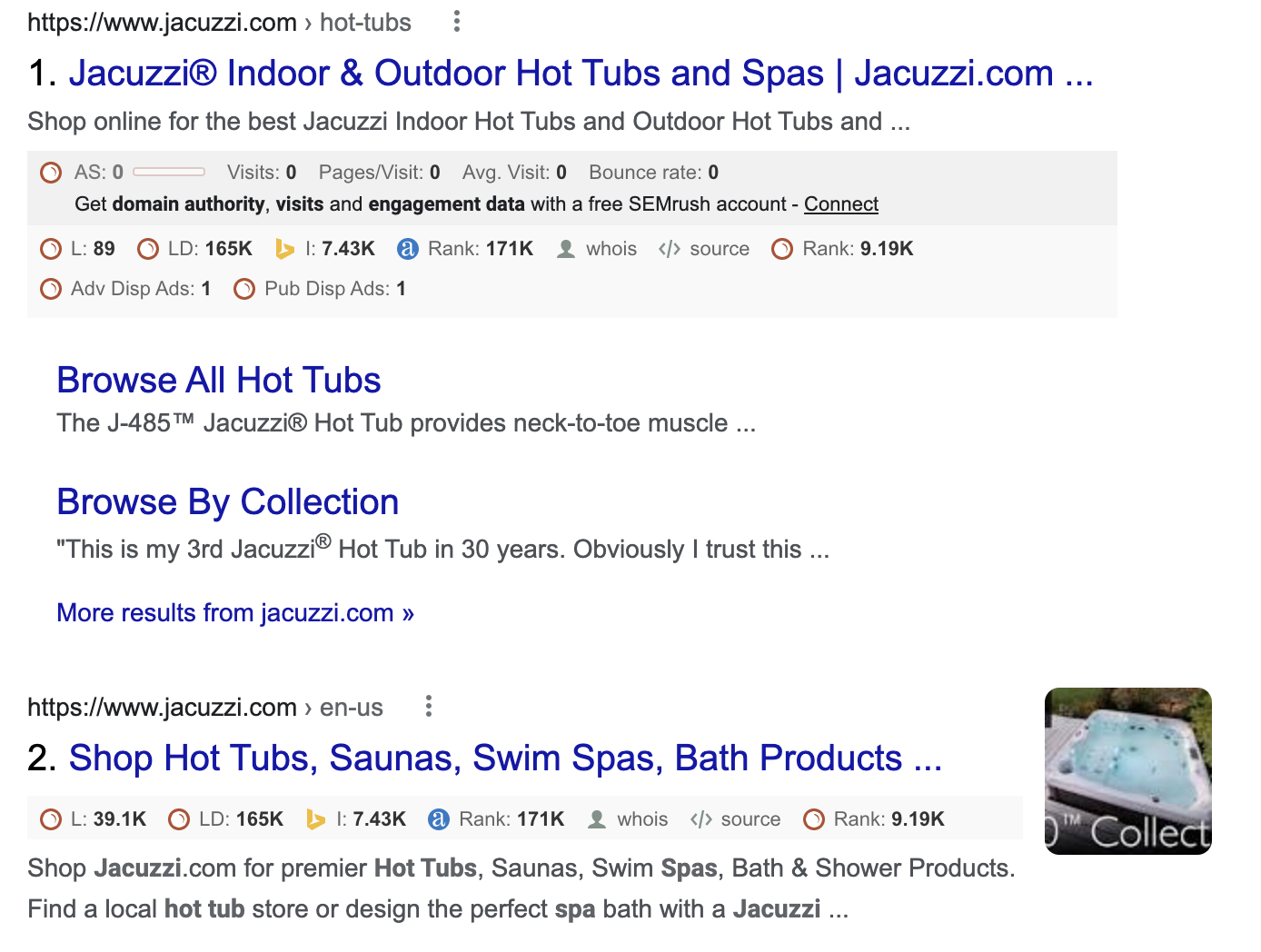
Focus on Long-tail Keywords With Reasonable Competition
We’ve talked a lot about long-tail keywords in this guide. And for good reason: they’re typically the best keywords to target for people that are new to digital marketing.
Learn Where to Place Keywords
Using keywords in your content (also known as “on-page SEO”) is a key part of ranking your website on Google.
That’s because where and when you include keywords help Google determine what your page is about.
In general, your content will perform better in search when you include keywords in your:
Page Titles Title Tags Meta Descriptions Alt Tags Headers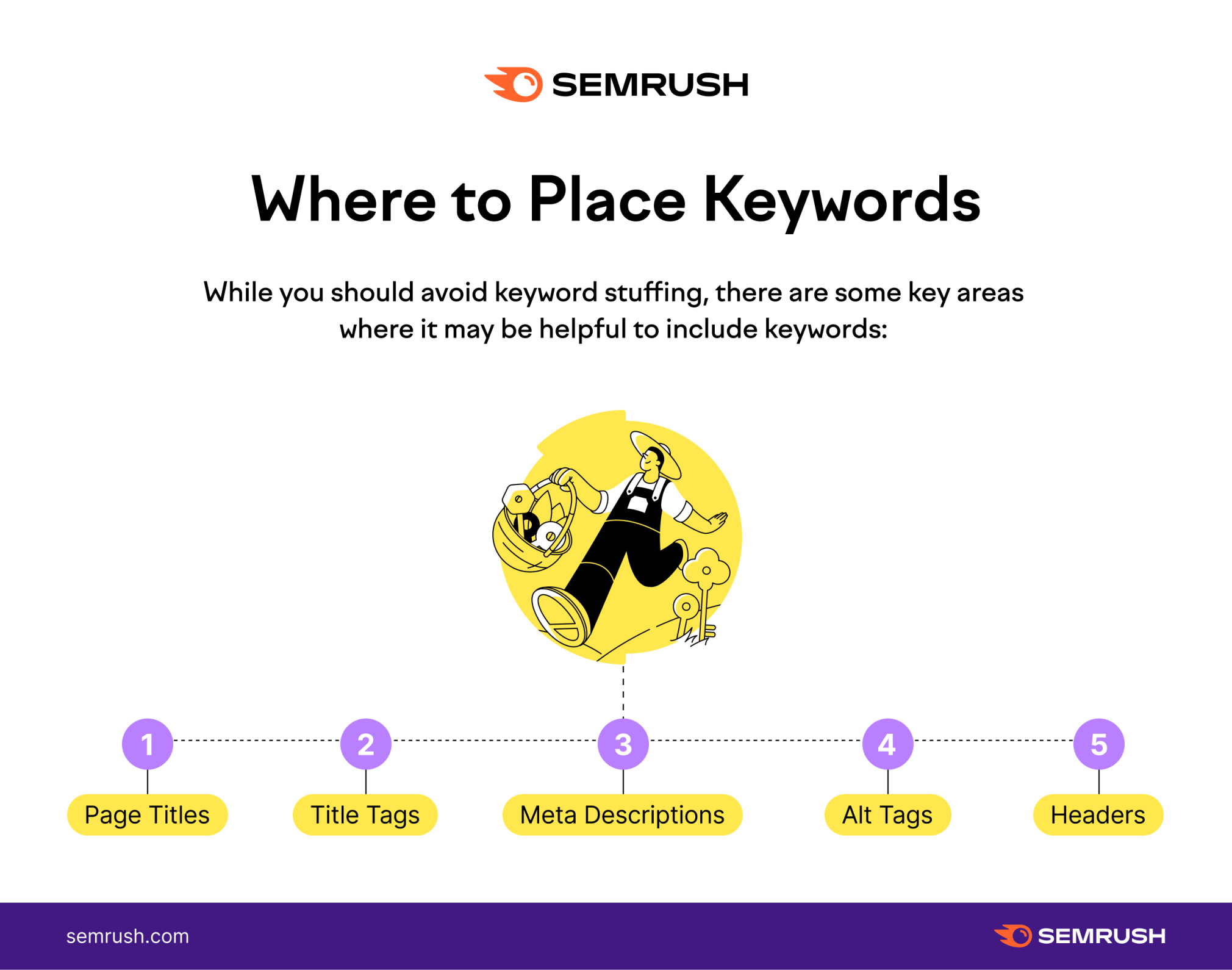
Conclusion
This article is over 3,000 words. Congrats on making it to the end!
We hope you didn’t just learn what keywords are. But hopefully, you also came away with practical knowledge of how to use keywords in your digital marketing efforts.
Now it’s time to take action on what you just learned. So go ahead and find keywords for your business. And start incorporating those keywords into your SEO and Google Ads campaigns.
Innovative SEO services
SEO is a patience game; no secret there. We`ll work with you to develop a Search strategy focused on producing increased traffic rankings in as early as 3-months.
A proven Allinclusive. SEO services for measuring, executing, and optimizing for Search Engine success. We say what we do and do what we say.
Our company as Semrush Agency Partner has designed a search engine optimization service that is both ethical and result-driven. We use the latest tools, strategies, and trends to help you move up in the search engines for the right keywords to get noticed by the right audience.
Today, you can schedule a Discovery call with us about your company needs.
Source:





![How to Find Low-Competition Keywords with Semrush [Super Easy]](https://allinclusive.agency/uploads/images/how-to-find-low-competition-keywords-with-semrush-super-easy.svg)